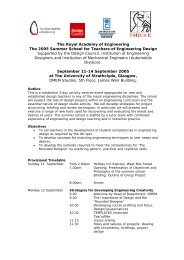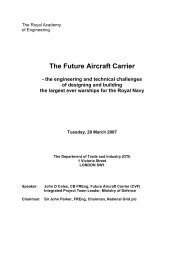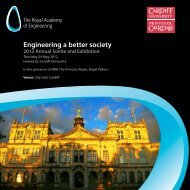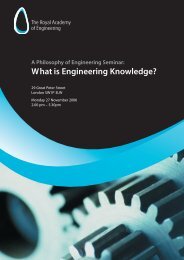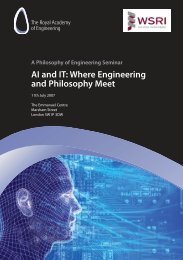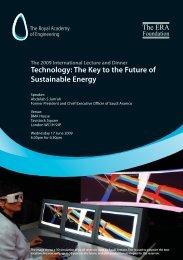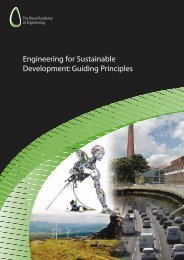Engineering Ethics: Do engineers owe duties to the
Engineering Ethics: Do engineers owe duties to the
Engineering Ethics: Do engineers owe duties to the
Create successful ePaper yourself
Turn your PDF publications into a flip-book with our unique Google optimized e-Paper software.
The Lloyd’s Register Lecture<br />
Conclusions<br />
This paper has attempted <strong>to</strong> investigate one aspect of <strong>Engineering</strong> ethics in terms of <strong>the</strong> underlying<br />
assumption of many individual codes and institutional rules that Engineers <strong>owe</strong> a duty <strong>to</strong> <strong>the</strong> public. An<br />
examination of <strong>the</strong> law of contract and of <strong>to</strong>rtious negligence confirms that legal <strong>duties</strong> are <strong>owe</strong>d <strong>to</strong> a wide,<br />
but limited class of persons and that <strong>duties</strong> <strong>to</strong> <strong>the</strong> public are not in general enforceable against individual<br />
Engineers by or on behalf of members of <strong>the</strong> public. The inquiry has, h<strong>owe</strong>ver, identified many separate<br />
ethical issues which merit fur<strong>the</strong>r research. In addition, a number of ethical dimensions have been identified<br />
within existing legal principles, particularly in terms of <strong>the</strong> limits on <strong>the</strong> extent <strong>to</strong> which <strong>the</strong> Courts will<br />
enforce contractual obligations where <strong>the</strong> public interest is involved.<br />
The lack of legal backing as respects <strong>the</strong> action of individual Engineers requires consideration of o<strong>the</strong>r means<br />
by which <strong>the</strong> assumption of a duty <strong>to</strong> <strong>the</strong> public may be given appropriate effect. The first approach is<br />
through appropriate disciplinary action by <strong>the</strong> Institution by whom any offending member is held out as<br />
qualified. While <strong>the</strong> general absence of compulsory registration in regard <strong>to</strong> <strong>Engineering</strong> activities deprives<br />
such disciplinary action of <strong>the</strong> effect which it would have in a more closely regulated profession, <strong>the</strong><br />
possibility of action being taken against Institutions by individuals who suffer loss due <strong>to</strong> <strong>the</strong> negligence of<br />
accredited members means that <strong>the</strong> Institutions have a real interest in pursuing disciplinary measures. If more<br />
systematic enforcement is <strong>to</strong> be considered by <strong>the</strong> UK Institutions, it is important that <strong>the</strong>y should avoid <strong>the</strong><br />
tendency <strong>to</strong> fragment, and that <strong>the</strong> opportunity is taken <strong>to</strong> learn from experience elsewhere, notably Australia.<br />
Plainly, if <strong>the</strong> UK Institutions are <strong>to</strong> take this enhanced role seriously, <strong>the</strong>y must begin by speaking with one<br />
voice, as proposed by <strong>the</strong> <strong>Engineering</strong> Council in one of its last acts. There is, in addition, growing interest in<br />
<strong>the</strong> UK in an alternative sphere of action by which professional Institutions may seek <strong>to</strong> intervene in Court<br />
proceedings involving <strong>Engineering</strong> issues, where <strong>the</strong> public interest is thought <strong>to</strong> provide justification. Such<br />
proceedings have developed rapidly in <strong>the</strong> USA <strong>to</strong> such extent that <strong>the</strong> Courts <strong>the</strong>re are now somewhat<br />
stringent in permitting this form of intervention. Such experience will no doubt be considered carefully by <strong>the</strong><br />
UK Institutions when deciding whe<strong>the</strong>r <strong>to</strong> follow this example.<br />
The most significant area of activity in terms of public duty and <strong>the</strong> maintenance of ethical standards in<br />
<strong>Engineering</strong> is in relation <strong>to</strong> <strong>the</strong> giving of warnings about preventable disasters. This has been <strong>the</strong> subject of<br />
considerable activity and thought in <strong>the</strong> UK. Given that Engineers in responsible positions continue <strong>to</strong> be<br />
motivated by a public duty, many subsidiary questions arise as <strong>to</strong> how individual Engineers should conduct<br />
<strong>the</strong>mselves and as <strong>to</strong> how those who seek <strong>to</strong> act in <strong>the</strong> public interest should be appropriately protected<br />
against <strong>the</strong> consequences of <strong>the</strong>ir actions. This paper has reviewed <strong>the</strong> major issues and current guidelines<br />
available.<br />
It can be concluded that a duty <strong>to</strong> <strong>the</strong> public, assumed and required in many Institutional Codes and rules,<br />
exists both in <strong>the</strong> letter <strong>to</strong> <strong>the</strong> extent that Institutions are prepared <strong>to</strong> take enforcement action, and in <strong>the</strong><br />
spirit, through <strong>the</strong> selfless action taken by individual Engineers in <strong>the</strong> public interest. The task of translating<br />
public duty in particular circumstances in<strong>to</strong> appropriate action can be difficult, complex and risky both for<br />
<strong>the</strong> individual and for <strong>the</strong> corporate bodies involved. While support systems exist <strong>the</strong>y remain fragmented<br />
and piecemeal and <strong>the</strong>re can be little doubt that <strong>the</strong> principal burden will remain on <strong>the</strong> individual Engineers.<br />
It is thus a matter of <strong>the</strong> highest importance that individual Engineers should continue <strong>to</strong> acquire <strong>the</strong>ir<br />
training and experience on <strong>the</strong> footing that a duty <strong>to</strong> <strong>the</strong> public does exist which, on occasions, transcends all<br />
o<strong>the</strong>r <strong>duties</strong> under which <strong>the</strong> Engineer operates.<br />
Given <strong>the</strong> high profile accorded <strong>to</strong> <strong>the</strong> debate on medical (now re-named bio) ethics in <strong>the</strong> last decade, it is<br />
fitting and timely that <strong>Engineering</strong> ethics should be accorded a status appropriate <strong>to</strong> its public importance.<br />
The <strong>Engineering</strong> Institutions must take a lead in this process. In doing so, <strong>the</strong> most important condition is<br />
that <strong>the</strong>y should act <strong>to</strong>ge<strong>the</strong>r, a feat which is almost without precedent. Only by <strong>the</strong>se means will Engineers<br />
and <strong>the</strong> public <strong>the</strong>y serve be able <strong>to</strong> establish <strong>the</strong> bond of trust that presently seems <strong>to</strong> be lacking.<br />
Acknowledgment<br />
I would like <strong>to</strong> acknowledge <strong>the</strong> considerable assistance received in preparing this paper from many<br />
individuals, notably Ms Juliette La Chapelle on US practice, Mr Toni de Fina on Australian practice, Professor<br />
Charles Turner FREng on amicus issues and <strong>the</strong> staff of <strong>the</strong> Royal Academy of <strong>Engineering</strong> on UK materials.<br />
20 The Royal Academy of <strong>Engineering</strong>






